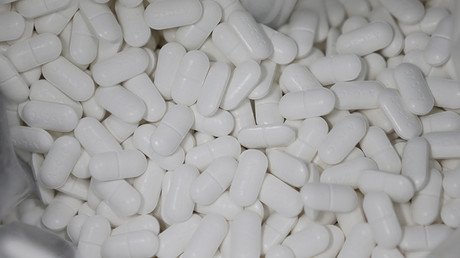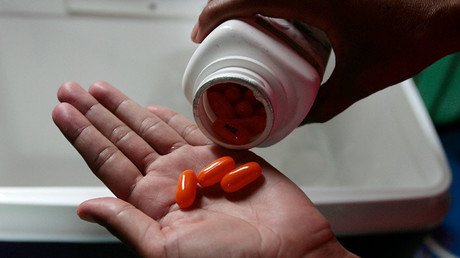Historic 1st: FDA calls for opioid to be removed from market based on risk of abuse

In an unprecedented move, the US Food and Drug Administration has requested a drugmaker withdraw an opioid pain medicine from the market due to its potential for abuse. The agency cited the current "opioid epidemic" as a catalyst for the move.
The FDA has targeted the reformulated version of Opana ER, or oxymorphone hydrochloride, for market removal, calling on its manufacturer, Ireland-based Endo Pharmaceuticals, to take voluntary steps to do so.
If Endo chooses not to withdraw Opana ER ‒ first approved by the FDA in 2006 – the federal agency said it would take steps to rescind its approval of the drug.
"We are facing an opioid epidemic ‒ a public health crisis, and we must take all necessary steps to reduce the scope of opioid misuse and abuse,"said FDA Commissioner Scott Gottlieb.
Joe welcomed FDA’s request to remove prescription opioid medication Opana from the market. https://t.co/XO6cvbRqR5pic.twitter.com/6TWybQoNKl
— Senator Joe Donnelly (@SenDonnelly) June 8, 2017
The regulatory agency said its call for withdrawal is based on data that showed a "significant shift in the route of abuse of Opana ER from nasal to injection" once the drug was reformulated in 2012.
The reformulation was intended to make the drug resistant to manipulation that could increase abuse by snorting or injecting, the FDA said. The agency determined upon approval of the reformation in 2012 that there was no evidence of meaningful reduction in abuse potential connected to the allegedly abuse-resistant version.
"With more information about the risks of the reformulated product," the FDA said, it is now taking action to remove the drug.
Abuse of reformulated Opana ER by injection has been linked to a "serious outbreak" of HIV and hepatitis C, the FDA said.
The FDA's decision follows an 18-8 vote in March by an FDA advisory committee that concluded the risks of the drug outweigh the benefits.
"The abuse and manipulation of reformulated Opana ER by injection has resulted in a serious disease outbreak. When we determined that the product had dangerous unintended consequences, we made a decision to request its withdrawal from the market," said Janet Woodcock, director of the FDA's Center for Drug Evaluation and Research. "This action will protect the public from further potential for misuse and abuse of this product."
Endo Pharmaceuticals has a US base of operations in Malvern, Pennsylvania, a state that had the sixth-highest rate of drug overdose deaths among all US states in 2015, according to the Centers for Disease Control and Prevention (CDC).
US Senator Joe Donnelly (D-Indiana) hailed the FDA's decision, saying, "Opana played a major role in the opioid abuse epidemic and was at the heart of the opioid and HIV crisis in Scott County" in Indiana.
In 2015, a surge of HIV infection hit rural, impoverished Scott County, Indiana. By April 2016, nearly 200 cases of HIV had been reported, according to the Indianapolis Star. The outbreak was linked to intravenous use of Opana amid the state's funding cuts, led by then-Governor Mike Pence, for needle-sharing programs and health centers that offer HIV testing, like Planned Parenthood.
The FDA's historic call for the withdrawal of an opioid based on abuse risks occurs amid an drug-abuse crisis in the US that has hit alarming levels. In February, the CDC's National Center for Health Statistics reported that, in 2015, drug-overdose deaths had increased to 52,404, a 27-percent jump in just five years.
The state of Ohio recently sued five drugmakers over accusations that they intentionally misled patients about the dangers of abuse, among other claims. The lawsuit said brand-name drugs such as OxyContin and Percocet, and generics such as oxycodone and hydrodone, are powerful narcotic painkillers that historically “were considered too addictive and debilitating for the treatment of chronic pain (like back pain, migraines and arthritis),” and were only meant to treat “short-term acute pain or for palliative (end of life) care.”
















